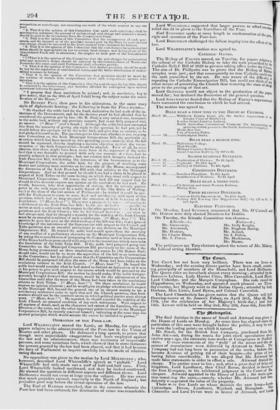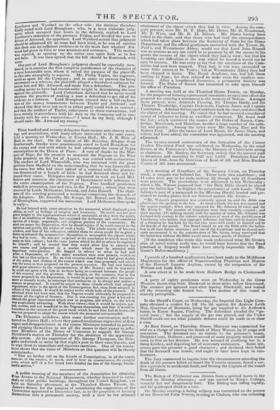tEbe AfIttropaliC
The final decision in the cause of Small and Attwood was given in the House of Lords on Monday. As some time has elapsed since the particulars of this case were brought before the public, it may be well to state the leading points on which it turned.
Mr. Small, for the British Iron Company, purchased from Mr. John Attwood, during the mania for joint stock speculations about twelve years ago, the extensive iron-works at Corngreuves in Stafford. shire. C,.rtain statements of the " yield " of the mines and the tu penses of manufacture were delivered by Attwood to Small. The Company had slot long been in possession of the works, before they became desirous of getting rid of their bargain—the price of iron having fallen considerably. It was alleged that Mr. Attwood lad made false statements in order to effect a sale. Attwood denied ths charge. The parties went to law ; and, after a great deal of delay sal litigation, Lord Lyndhurst, then Chief Baron, decided M favours.' the Iron Cmnpany, in his celebrated judgment in the Court of Fa. chequer. Attwood appealed to the House of Lords ; the main yes- tion remaamilmg the same,—namely, whether Mr. Attwood had fro. dulently e usizger ate d the value of the property. There were five Lords on whose decision the case hung—Lila' Cottenham, Devon Lyndhurst, Wynford, aad Brougham. lb° Chancello and Lord Devon were in favour of Attwood, and Lou
Lyndhurst and Wynford on the other side : the decision therefore finally rested with L i
Lord Brougham ; who, in a most elaborate Judg- inent, which occupied four hours n the delivery, replied to Lord Lyndburst's statement of the previous Friday, and decided the case in favour of Attwood, the appellant. Lord Wynford moved that judgment should be adjourned till. an issue bad been tried, as he was of opinion that there was no sufficient evidence as to the main fact whether Att- wood had given in false or true accounts and estimates. This motion was rejected, as opening up the entire case again both as to law and facts.
It was then agreed that the bill should be dismissed, with costs.
One part of Lord Brougham's judgment should be especially men- tioned, as it contains the first complete justification of the character of a most honourable man, whom It suited the purpose of the plaintiffs in this ease wrongfully to asperse. Mr. Philip Taylor, the engineer, acted as agent for the Company ; and in order to prevent his being summoned as a witness, the plaintiffs alleged a fraudulent collusion be- tween him and Mr. Attwood, and made him a defendant. This pro- . ceeding seems to have had considerable weight in determining the case against the plaintiffs. Lord Cottenham declared that he never would sanction the practice of making a man a defendant to get rid of his evidence as a witness. Lord Brougham entered into a full explana- tion of the money transactions between Taylor and Attwood ; and showed that they were not such as either party could wish to conceal ; and that the conduct of Taylor, subsequent to those transactions, had been strictly in accordance with his duty to the Company and in con. formity with his own expression—" I must do my duty, although I should make Mr. Attwood my enemy."



























 Previous page
Previous page